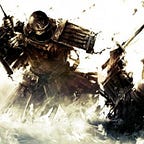Intellect Is Not Enough
Five Quotes About What Good Military Leaders Require
I. From a report concerning men recruited to work for the OSS (Office of Strategic Services during WWII):
“The organization has been recruiting too many men, civilian or military, who have intelligence and sometimes the necessary mechanical training but who lack common sense, know nothing about working with men or how to look after the welfare and morale of the men under them. We simply must have men who can shoulder responsibility and use initiative with common sense. Simply because a man is intelligent does not qualify him for this type of work.”
II. Then-Major Carstens, OIC of a SF detachment commanders’ course in 2002, cited by MAJ Major Fernando M. Luján in his report Light Footprints: The Future of American Military Intervention:
“The OSS, when selecting officers to parachute into occupied France, described the ideal candidate as a Ph.D. that can win a bar fight. We don’t just want an officer that can carry a hundred-pound rucksack on his back. We need someone who can think and improvise.”
III. Statement made by German general Hermann Balck about a division commander in WWII on the eastern front:
“It is interesting to note, incidentally, that this fellow was a highly rated General Staff officer. Clever, but unfortunately not very practical. So we were always brought back to the fact that cleverness is a curse. Clausewitz once said, ‘Man needs a harmony of strengths.’”
IV. Michael Kenney, From Pablo to Osama:
“The concept, James C. Scott reminds us, comes from the ancient Greek poets and philosophers. Mētis refers to a broad range of practical skills that sailors, athletes, doctors, statesmen, and others use to respond to a ‘a constantly changing natural and human environment,’ including prudence, perceptiveness, ingenuity, elusiveness, and deceit. This crafty intelligence ‘bears on fluid situations which are constantly changing and which at every moment combine contrary features and forces that are opposed to each other,’ observe Marcel Detienne and Jean-Pierre Vernant, a pair of Greek classicists and two of the foremost authorities on the subject.”
V. Anna Simmons, in her paper 21st Century Cultures of War: Advantage Them, highlights the need for ‘wile’:
“Wile requires at least four attributes: 1) the ability to identify that feature or set of features in an adversary’s culture that can be used as the fulcrum by, with, and through which to permanently alter conditions, 2) the ability to read all players so that you know how to appeal to, neutralize, and/or outwit each equally well, 3) an intuitive ability to tease, test, and probe so that you can make your own opportunities and don’t operate on others’ timeline(s), and 4) an appetite for twitting others, which means relishing the idea of turning the tables on adversaries in order to cause them to undo themselves…commanders [must] be able to apply wile: a) locally, b) coordinating across locations and over time, and c) supralocally in order to both buy and control time.”
